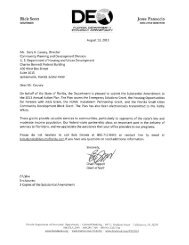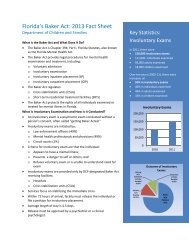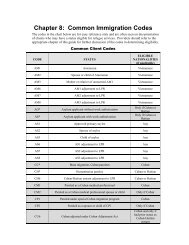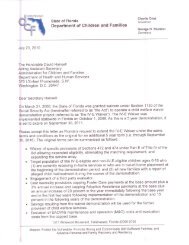The National Strategy for Child Exploitation Prevention and Interdiction
The National Strategy for Child Exploitation Prevention and Interdiction
The National Strategy for Child Exploitation Prevention and Interdiction
You also want an ePaper? Increase the reach of your titles
YUMPU automatically turns print PDFs into web optimized ePapers that Google loves.
<strong>The</strong> DEU is the principal group responsible <strong>for</strong> the collection, preservation, <strong>and</strong> examination ofcomputer digital evidence in support of all Inspection Service investigations. Digital evidenceanalysts are tasked with examining computer evidence <strong>and</strong> any digital media <strong>for</strong> in<strong>for</strong>mation ordata pertinent to Postal Inspection Service investigations. Examples of cases that mayincorporate this type of evidence are: child pornography/exploitation, homicide, rape, suicide,mail theft, fraud, identity theft, or other related crimes against the Postal Service. Approximately26% of the digital <strong>for</strong>ensic work conducted by the DEU involves child exploitation cases. In FY2008, the DEU conducted 269 child exploitation <strong>for</strong>ensic examinations; in FY 2009, it conducted260; <strong>and</strong> in the first six months of FY 2010, it has conducted 105. In addition to processingcases, the Digital Evidence Unit is available <strong>for</strong> technical advice <strong>and</strong> assistance in seizing <strong>and</strong>preserving evidence at the crime scene.4. ICE Computer Forensics Program<strong>The</strong> ICE Computer Forensics Program (CFP) was <strong>for</strong>malized under the legacy U.S. CustomsService in 1997 under the Office of Investigations. <strong>The</strong> ICE CFP continues to operate under theICE Office of Investigations as a Section within the ICE Cyber Crimes Center (C3).<strong>The</strong> Computer Forensics Section (CFS) provides programmatic oversight, equipment, technicalsupport, guidance <strong>and</strong> training to the entire ICE Computer Forensics Program (CFP). <strong>The</strong> ICECFP is comprised of ICE Special Agents <strong>and</strong> Criminal Research Officers, trained <strong>and</strong> equippedto conduct analysis of digital evidence in furtherance of criminal investigations. <strong>The</strong> successfulinvestigation <strong>and</strong> prosecution of criminal violations by ICE is largely dependent on the ability toquickly seize, process, <strong>and</strong> analyze evidentiary digital data obtained from seized electronicdevices <strong>and</strong> digital media. To meet the goals <strong>and</strong> objectives of the overall ICE mission, the ICECFS draws upon a long-st<strong>and</strong>ing, comprehensive training curriculum that provides ComputerForensics Agents/Analysts (CFA) with basic <strong>and</strong> advanced computer <strong>for</strong>ensics training skills.To support the CFP, the CFS also conducts research <strong>and</strong> development <strong>and</strong> initiates projects innew <strong>and</strong> challenging technologies. <strong>The</strong> CFS continually procures software, equipment, supplies,upgrades, storage media, <strong>and</strong> new digital <strong>for</strong>ensic equipment to support the CFP in meeting thedem<strong>and</strong>s posed by these ever-changing technologies. <strong>The</strong> CFS also monitors <strong>and</strong> tracks theefficiency <strong>and</strong> production of the CFP <strong>and</strong> responds to requests <strong>for</strong> assistance <strong>and</strong> operationalsupport. <strong>The</strong> CFS promotes continuing education, such as professional <strong>and</strong> industry-st<strong>and</strong>ardcertification initiatives, in an ef<strong>for</strong>t to ensure that CFAs in the field are trained <strong>and</strong> certified inthe most current computer <strong>for</strong>ensics techniques. <strong>The</strong>re are currently 240 trained ComputerForensics Agents in 105 field offices worldwide.<strong>The</strong> Treasury Computer Forensics Training Program (TCFTP) is at the core of the ICE CFP <strong>and</strong>is a joint training initiative funded by the Treasury Executive Office of Asset Forfeiture(TEOAF). <strong>The</strong> TCFTP is comprised of the respective computer <strong>for</strong>ensics <strong>and</strong> training programsof ICE, the U.S. Secret Service, <strong>and</strong> Internal Revenue Service. Since the inception of the TCFTPin 1997, approximately 325 ICE Special Agents have been trained.In FY 2005, ICE initiated a Regional Computer Forensic Storage Program with funding from aCongressional earmark. During the past four years, ICE has provided funding <strong>for</strong> the project,134
















